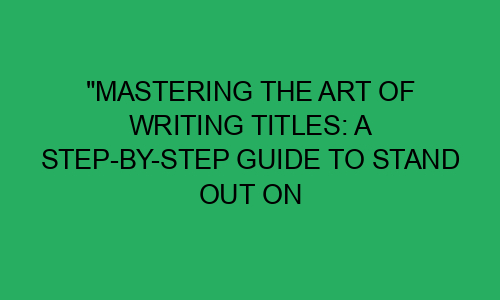Introduction:
As a writer, the ability to create an attention-grabbing title is essential. A well-crafted title not only hooks the reader but also helps your content stand out on Google. However, mastering the art of writing titles can be a daunting task. But fret not, as we present to you a step-by-step guide to create titles that make your content shine on Google. Whether you are writing a blog post, article, or an academic paper, this guide will help you craft memorable titles that make your work stand out.
Section 1: Understand Your Audience
The first step in creating any title is understanding your audience. Who are you writing for? What are their interests and needs? By having a clear understanding of your audience, you can craft titles that appeal directly to their interests and desires. Make sure you know what motivates your audience and use that knowledge to create titles that resonate with them.
Section 2: Analyze Your Topic
Once you have a clear understanding of your audience, it’s time to analyze your topic. Use tools like Google Trends or Keyword Planner to identify popular keywords, long-tail keywords, and relevant topics. By researching popular search terms related to your topic, you can create titles that perform well on Google.
Section 3: Craft a Hook
The next step in crafting a memorable title is to create a hook. The hook is the catchy phrase or statement that grabs the reader’s attention. A good hook should be intriguing, thought-provoking, or surprising. Use your creativity to come up with a unique hook that draws readers in and makes them want to read your content.
Section 4: Use Adjectives and Action Words
Adjectives and action words help to make your title more engaging. They add color and emotion to your content and help it stand out on Google. Use strong adjectives and action words to create titles that are memorable and impactful.
Section 5: Keep It Short and Sweet
Your title should be short and sweet – ideally between 8-12 words. A long title can be overwhelming and difficult for readers to retain. Aim to create titles that are succinct and to-the-point. This will help your title be more memorable and easier for readers to recall.
Section 6: Test Your Titles
Once you have crafted a few title options, test them out. Use tools like CoSchedule Headline Analyzer or Emotional Marketing Value (EMV) to test how effective your titles are. These tools analyze the emotional value of your titles and give a score that helps you determine how impactful your titles will be.
Section 7: Optimize for SEO
Lastly, optimize your titles for SEO. This means using long-tail keywords and ensuring your title reflects the content of your article or blog post. Optimizing your titles can help improve your search engine rankings and get more people reading your content.
FAQs:
1. Why is a good title important?
A well-crafted title can attract readers, improve search engine rankings, and summarize the content of your article or blog post.
2. How can I create a hook for my title?
A hook should be intriguing, thought-provoking, or surprising. Get creative and use unique phrases, puns, or rhetorical questions to hook your readers.
3. Should I use adjectives and action words in my title?
Yes, adjectives and action words help to create a more engaging title that is memorable and impactful.
4. How long should my title be?
It is recommended that your title be between 8-12 words for optimal impact and memorability.
5. Why should I test my title?
Testing your title helps you determine its impact on readers. This can help you choose the most effective title option.
6. How can I optimize my title for SEO?
Use long-tail keywords and ensure your title reflects the content of your article or blog post. This can help improve search engine rankings and attract more readers.
7. Can a good title compensate for poor content?
No, while a good title can attract readers, the content itself must be high-quality to maintain reader interest and engagement.
Conclusion:
By now, you have mastered the art of writing titles. Remember to understand your audience, analyze your topic, craft a hook, use adjectives and action words, keep it short and sweet, test your titles, and optimize for SEO. Don’t be afraid to get creative and experiment with different title formats. With these tips, you will create titles that grab reader attention and make your content stand out on Google. Happy writing! And don’t forget to share your work.

